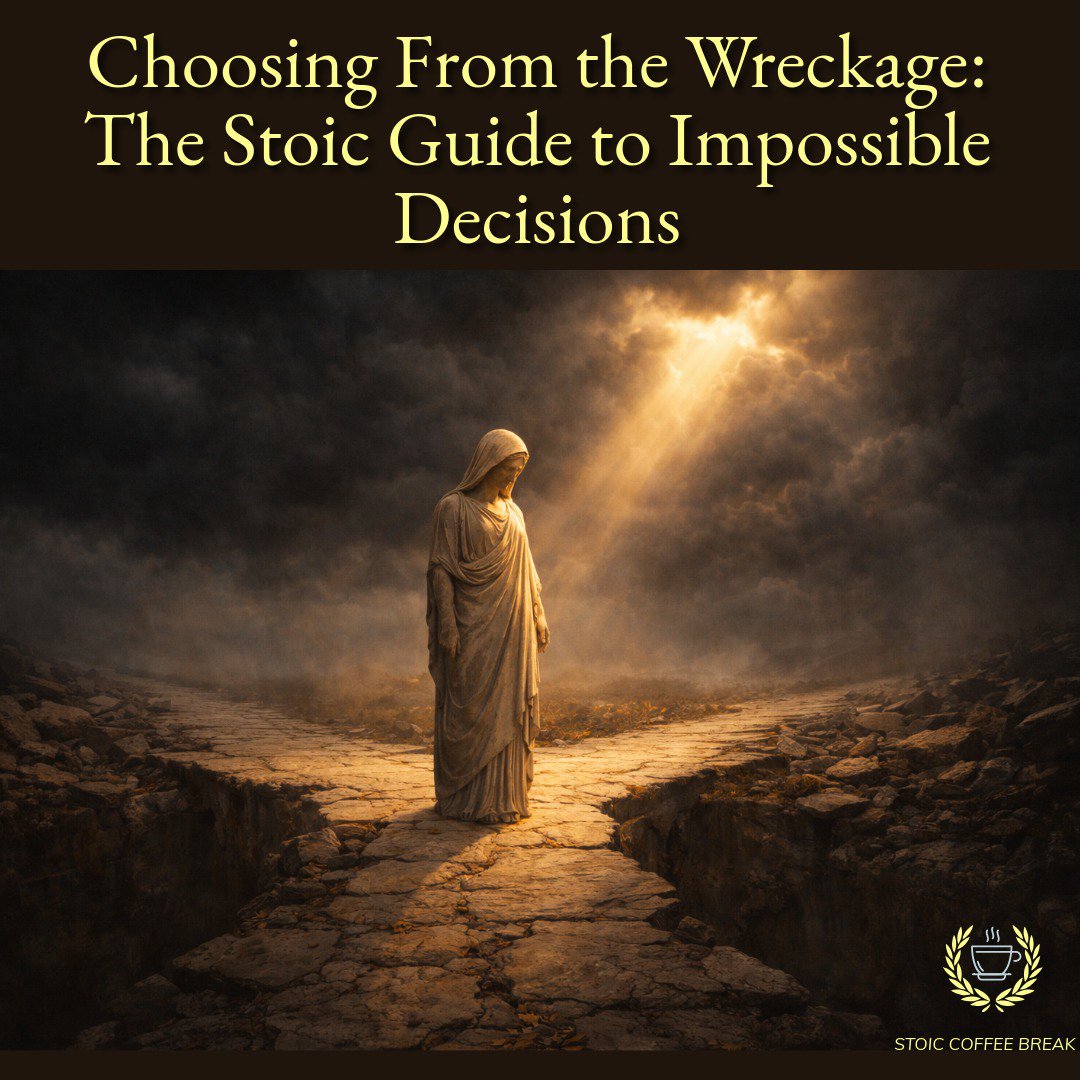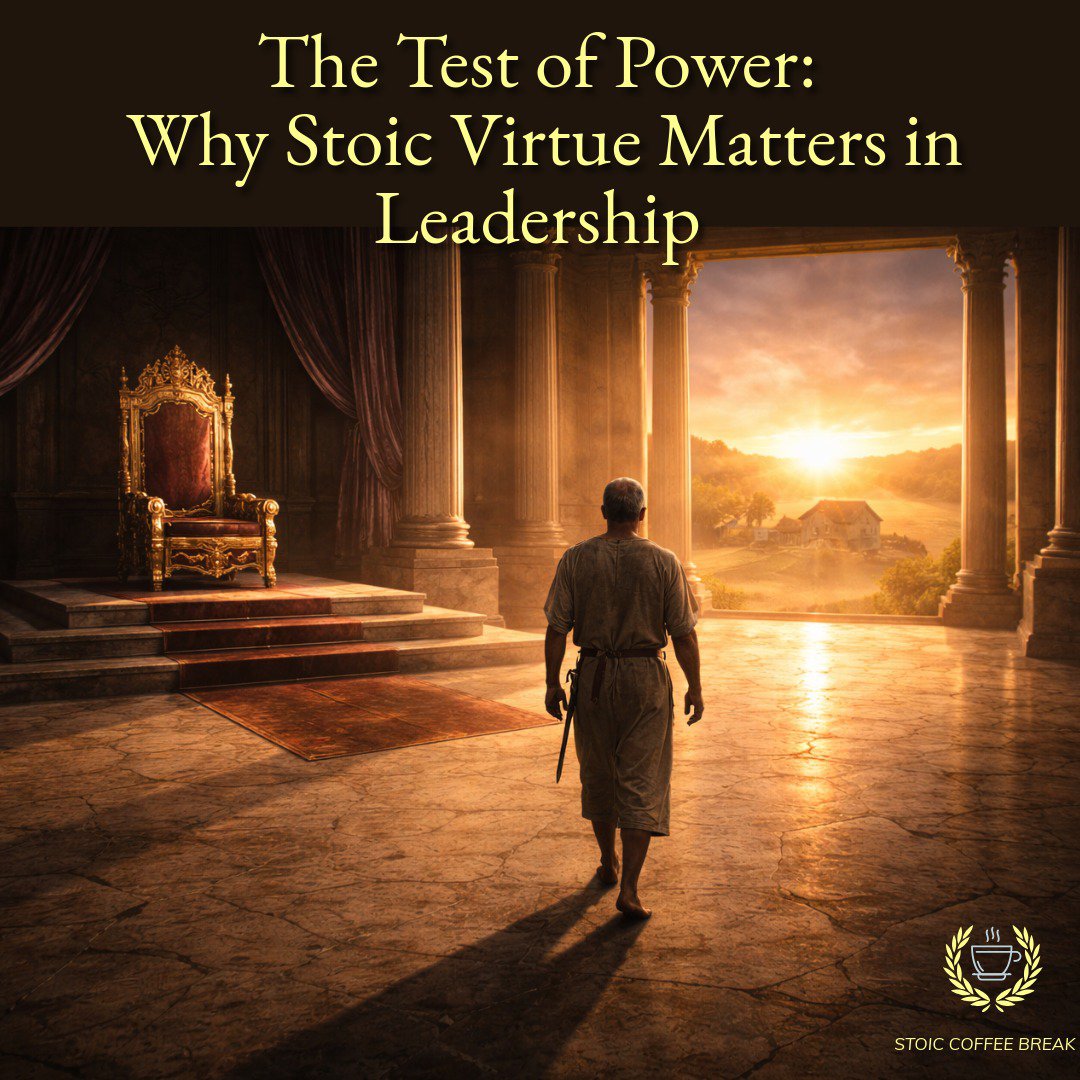
Do you feel like you're truly in charge of your emotions? It’s a question that can catch even the most reflective among us off-guard. Often, we feel as if our emotions are these wild, untamable forces that arise without our consent. We fear that adopting something like Stoicism might strip away the intensity of those feelings, leaving us like empty shells. But what if getting a handle on our emotions could help us experience them more deeply, rather than less?
“The only journey is the one within.”
—Rainer Maria Rilke
Growing up, I was a sensitive child. I wasn’t just touched by what people said—I was moved, shaken, often overwhelmed. A song could make me cry when others wouldn’t even notice its melody. An offhand comment could ruin my day. I was swept away by emotions I didn’t know how to control, and I’d find myself lashing out, only to be left with regret and shame. I remember being sent to detention more than once for arguing with teachers, convinced they were being unjust. It’s funny how convinced we can be that the world is wrong and we’re right—until we realize we might be the ones who need to change.
But what if your emotions were a compass, not a curse? For years, I felt like my emotions were a burden, something to be endured rather than understood. Even as I grew older, I still struggled to keep them in check. The irony is that in trying to suppress them, they only seemed to grow louder. Stoicism was the framework that finally helped me see clearly: I had been trying to control the wrong things. I was caught up in the turmoil of wanting others to like me, craving approval, and bending myself into shapes that didn’t suit me—all in the hopes of fitting someone else’s mold.
Control
Understanding what I control changed everything. When I finally grasped that I could control my thoughts and reactions but not the opinions of others, I experienced a kind of liberation. Stoicism showed me that if I focus on living up to my own values—kindness, courage, and integrity—then I don’t have to be imprisoned by what others think. It’s easier said than done, of course. But when I stopped needing everyone’s approval, I began to look inward and see that my own disapproval was the real problem. I wasn’t the person I wanted to be, and I was afraid to face that
Public Therapy
My podcast is my public therapy. One of the main reasons why I do this podcast is that it’s very therapeutic. Each week as I plan out an episode I learn something more about myself, and find better ways to manage my thinking, and as a result, my emotions. I’m sure some people would find sharing themselves and their struggles as openly as I do to be terrifying. But one of the things I’ve learned by being so vulnerable in you each week is that there’s nothing to be ashamed of, and that by sharing these things, I’m being authentically myself. I want to be someone that is open and unafraid and who knows himself.
Over the past few weeks, I’ve been thinking a lot about how I’m much more relaxed in my life and have a lot less anxiety. I also thought about how my emotional lows are far fewer, but it also seems like my emotional highs are also a lot lower. This made me wonder if I’ve become somewhat emotionally numb. It’s not an easy question to answer, so I decided to dig in and make sense of it, and see if there is anything I can do to make sure that in trying to be more in charge of my mind and my emotions, that I don’t become a emotionless automaton.
Apatheia
So what is apatheia? It’s a state of equanimity. It’s about letting emotions flow through you without getting trapped in them. It’s a Greek word that comes from a-, meaning “without” and pathos, meaning “suffering” or “passions”. In this case, “passions” means negative emotions such as anger, fear, anguish, and excessive joy. Now this shouldn’t be confused with the English word “apathy” which means to be “indifferent” or “impassive”. Apatheia about understanding how strong emotions are created, and how to manage them.
This isn’t just a theory; it’s something we can see in action. Soldiers train to manage fear and adrenaline in combat, and firefighters learn to stay calm in burning buildings. Their courage isn’t the absence of fear—it’s fear under control. As Epictetus wisely said:
“It’s not events themselves that disturb us, but our judgments about them.”
Beliefs
Beliefs shape our thoughts, and thoughts shape our emotions. This connection is so important to understand and often hidden beneath layers of unconscious assumptions. One belief that shaped much of my life was that love had to be earned. I thought I could only be loved if I pleased others, did what they wanted, or made them happy. This led me down a path of self-doubt and insecurity, constantly bending myself to fit others’ expectations. I didn’t realize it at the time, but I was putting my self-worth in the hands of everyone around me, instead of taking responsibility for it myself.
By dismantling the belief that love had to be earned, I learned to focus on being the person I wanted to be, rather than who others wanted me to be. This realization brought me closer to people, made me more open, and allowed me to be vulnerable without fear of rejection. Paradoxically, it’s only by letting go of the need for approval that we become truly free to connect with others.
Facing Fear
Facing your fears and embracing who you are can feel like looking into a mirror that’s been fogged up for years. The first time I wrote down all the things I didn’t like about myself, I was bracing for a monster. But what I found were the same fears and flaws that I had compassion for in others. I realized that if I could love my friends despite their shortcomings, why couldn’t I offer myself the same grace?
That’s the first step: accepting reality as it is. Not running away from it, not wishing it were different, but looking it straight in the eye and saying, “I see you.” This is the heart of Stoic apatheia—not numbness or indifference, but the ability to look at life’s storms and not be swept away by them. It’s what gives us the strength to dig deeper and understand our emotions, rather than be mastered by them.
But I know what you’re thinking—doesn’t that make Stoics robotic? Stoicism often gets misunderstood as emotional suppression. But being rational about emotions isn’t the same as rejecting them. It’s about knowing when to listen to them and when to let them go. This ability to stay calm doesn’t shut us off from emotions—it actually allows us to feel more deeply. Think of it like a floodgate. When the gate is open, the water flows freely. But if it’s shut, pressure builds up behind it, and it can burst with destructive force.
Finding Clarity Through Vulnerability
The funny thing about being vulnerable is that it’s like handing someone a key to a house you’re not sure you even want to enter. But once you do, you realize that the person you’re unlocking the door for is yourself. And this lesson came to life for me in a conversation I had with a good friend of mine recently. We were discussing a thought experiment shared by Simon Sinek in a podcast—one of those “what would you do” scenarios that’s so simple on the surface but can leave you reeling with its implications.
Simon asked, “Imagine you’re stuck in some dangerous, third-world prison, and you have just one phone call. Who would you call?” Without hesitating, I told my friend that he was the first person I thought of. Not just because he’s reliable or capable, but because I trust him. It was as if the words fell out before I had a chance to think. And then I realized something deeper: I was acknowledging that I’m willing to lean on someone else. I told him how much he means to me, how grateful I am to have him in my life. It’s a powerful thing, telling someone how much you value them without needing to hear anything in return.
And the best part? He didn’t think I was weird for saying it. He didn’t recoil or look for a way to deflect. Instead, he gratefully accepted it. He *heard* me. There’s a certain magic in that kind of exchange—a moment where you’re truly seen and yet still feel comfortable being exactly who you are. That’s what happens when you stop needing approval and start offering your true, unfiltered self. As Seneca once put it:
“But when you are looking on anyone as a friend when you do not trust him as you trust yourself, you are making a grave mistake, and have failed to grasp sufficiently the full force of true friendship.”
Going Deep
Embracing the depth of emotions without drowning. What I realized in that moment is that when you let go of the need to manipulate your emotions to get a specific response from others, you gain the freedom to experience those emotions more profoundly. You’re not trapped in the shallow waters of approval-seeking—you’re diving into the depths of real human connection. And the irony? When you stop chasing, the real connections come to you.
Face the Darkness
The courage to feel even the darkest emotions. By understanding the nature of emotions, Stoicism allows us to feel the full spectrum of human experience. Not just the highs of joy and excitement, but the lows of grief and despair. Because when we no longer fear emotions, we can invite them in. We can sit with sadness, mourn our losses, and come out stronger on the other side.
In the aftermath of deep personal loss—whether that’s the loss of a relationship, a job, or a loved one—it’s tempting to shut down those heavy emotions, to try to escape or numb ourselves. But Epictetus reminds us:
“People with a strong physical constitution can tolerate extremes of hot and cold; people of strong mental health can handle anger, grief, joy, and other emotions.”
Feeling Without Becoming Overwhelmed
I think what I’m trying to say is that by getting your fear and anxiety under control, by recognizing that most of those feelings are caused by your own thinking, you have more energy and capacity to feel emotions more deeply. When you stop letting everyday frustrations sap your strength, you’ll find yourself better equipped to handle the heartaches, the losses, and the moments that truly matter. The experience isn’t about becoming numb—it’s about gaining the resilience to sit with discomfort and still feel the beauty of life in its complexity.
It’s the same principle that soldiers apply when training to manage their responses under fire. When you’re trained to keep your cool even when facing the harshest of conditions, you don’t lose yourself to your emotions—you control them. They’re no longer your master; they’re your ally.
Emotional Mastery Isn’t Suppression
But does that mean you can simply shut out those darker emotions? I’ve found that trying to suppress feelings only adds more anxiety in the long run. When you don’t allow yourself to feel and process emotions, they don’t just disappear—they linger beneath the surface, causing more suffering. This is why people turn to alcohol or drugs to cope—they’re trying to numb something that can only be healed by facing it head-on.
Cognitive Behavioral Therapy (CBT) and Acceptance and Commitment Therapy (ACT), both rooted in Stoic principles, are tools designed to help people handle overwhelming emotions by confronting them, rather than avoiding them. They help us see that even the darkest emotions have a place, and when managed correctly, they can lead us to a deeper understanding of ourselves and others.
The Power of Honest Connection
Stoicism isn’t about rejecting emotions. It’s about harnessing them to live more authentically, to be more open, and to connect more deeply with those around you. It allows you to stand firm in the face of life’s storms—not because you’re unfeeling, but because you’re strong enough to feel everything without being destroyed by it.
So, while some may view Stoic calm as a kind of emotional detachment, the reality is that it allows us to feel and experience life more fully. Because when we’re no longer afraid of what we feel, we can finally embrace the full, rich spectrum of the human experience—bravely, vulnerably, and without apology.
And that’s the power of Stoicism—it gives us a framework to understand ourselves, accept our flaws, and harness our emotions to live more fully. Not less. It’s not about cutting ourselves off from the world, but about embracing it with open eyes and a steady heart. So yes, mastering emotions may mean you’re less reactive, but it also means you have the capacity to feel the richness of life more fully, without being overwhelmed.
And that, I think, is a journey worth taking.
Book a free leadership coaching session!
Visit the Stoic Coffee Break website for more episodes, transcripts, and merch.
Find out more about the Leadership Mastermind.
Watch this episode on YouTube!
Find me on linkedIn, instagram, twitter, or threads.
Thanks again for listening!


